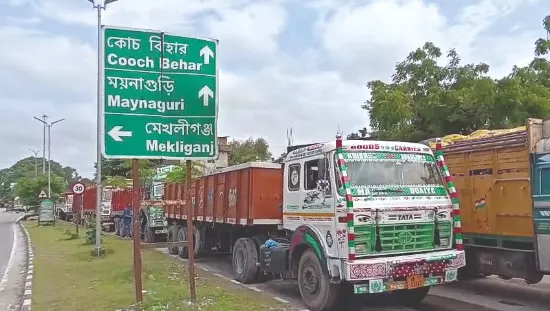
Jalpaiguri, July 3 -- The ongoing diplomatic strain between India and Bangladesh is having a devastating impact on thousands of daily wage workers who rely on cross-border trade to survive. With the movement of goods-laden trucks through the Changrabandha border in Bengal nearly halted, livelihoods on both sides of the international boundary are collapsing.
Trade disruptions triggered by India's imposition of stringent import-export restrictions have brought economic activity in border areas like Changrabandha (India) and Burimari (Bangladesh) to a near standstill. Officials estimate that nearly 4,000 workers across both countries have lost their jobs due to the slowdown.
While India continues to permit Bangladeshi nationals to enter on medical and student visas, business and tourist visas remain suspended. Despite heavy security deployment at the Changrabandha border, economic activity has thinned dramatically-leaving laborers struggling to earn even enough for a daily meal.
"Truck movement has dropped sharply. Due to the trade curbs, thousands of labourers involved in cross-border commerce have become unemployed. Economically, Changrabandha is crumbling," said Zakir Hossain, a local businessman. While exports of crushed stones to Bangladesh have ceased, limited shipments of boulders continue. Akbar Ali, a truck driver from Assam, explained: "Garments, fruits, snacks, plastic items and furniture are no longer allowed into Bangladesh. Earlier, nearly 200 trucks left for Bangladesh daily; now, it's down to just 30-35. Over 1,500 local workers have lost their jobs."
The situation is equally grim across the border. Abdul Hanif, a truck driver from Burimari, said: "Nearly 2,000 workers here are out of work. Export to India has almost stopped and shipments to Nepal and Bhutan are also suspended. Previously, 150 trucks crossed daily. Now, only 20 to 25 trucks operate."
For labourers like Makhan Ray, who earn a living loading and unloading goods at Changrabandha, the future remains uncertain. "The country comes first, no doubt. But without truck movement, we're starving. Drivers, helpers, labourers-we're all just hoping that normal trade resumes soon. That's the only lifeline we have."
Published by HT Digital Content Services with permission from Millennium Post.
